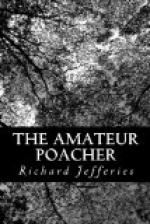First came an old man, walking stiffly—not so much from age as rheumatism—and helping his unsteady steps on the slippery sarsen stones with a stout ground-ash staff. Behind him followed a younger man, and in the rear a boy. Sometimes there was an extra assistant, making four; sometimes there was only the old man and one companion. Each had a long and strong ash stick across his shoulder, on which a load of rabbits was slung, an equal number in front and behind, to balance. The old fellow, who was dressed shabbily even for a labourer, was the contractor for the rabbits shot or ferreted in these woods.
He took the whole number at a certain fixed price all round, and made what he could out of them. Every evening in the season he went to the woods to fetch those that had been captured during the day, conveying them to his cottage on the outskirts of the village. From thence they went by carrier’s cart to the railway. Old Luke’s books, such as they were, were quite beyond the understanding of any one but himself and his wife; nor could even they themselves tell you exactly how many dozen he purchased in the year. But in his cups the wicked old hypocrite had often been known to boast that he paid the lord of the manor as much money as the rent of a small farm.
One of Luke’s eyes was closed with a kind of watery rheum, and was never opened except when he thought a rabbit was about to jump into a net. The other was but half open, and so overhung with a thick grey eyebrow as to be barely visible. His cheeks were the hue of clay, his chin scrubby, and a lanky black forelock depended over one temple. A battered felt hat, a ragged discoloured slop, and corduroys stained with the clay of the banks completed his squalid costume.
A more miserable object or one apparently more deserving of pity it would be hard to imagine. To see him crawl with slow and feeble steps across the fields in winter, gradually working his way in the teeth of a driving rain, was enough to arouse compassion in the hardest heart: there was something so utterly woebegone in his whole aspect—so weather-beaten, as if he had been rained upon ever since childhood. He seemed humbled to the ground—crushed and spiritless.
Now and then Luke was employed by some of the farmers to do their ferreting for them and to catch the rabbits in the banks by the roadside. More than once benevolent people driving by in their cosy cushioned carriages, and seeing this lonely wretch in the bitter wind watching a rabbit’s hole as if he were a dog well beaten and thrashed, had been known to stop and call the poor old fellow to the carriage door. Then Luke would lay his hand on his knee, shake his head, and sorrowfully state his pains and miseries: ’Aw, I be ter-rable bad, I be,’ he would say; ’I be most terrable bad: I can’t but just drag my leg out of this yer ditch. It be a dull job, bless ‘ee, this yer.’ The tone, the look of the man, the dreary winter landscape all so thoroughly agreed together that a few small silver coins would drop into his hand, and Luke, with a deep groaning sigh of thankfulness, would bow and scrape and go back to his ‘dull job.’




